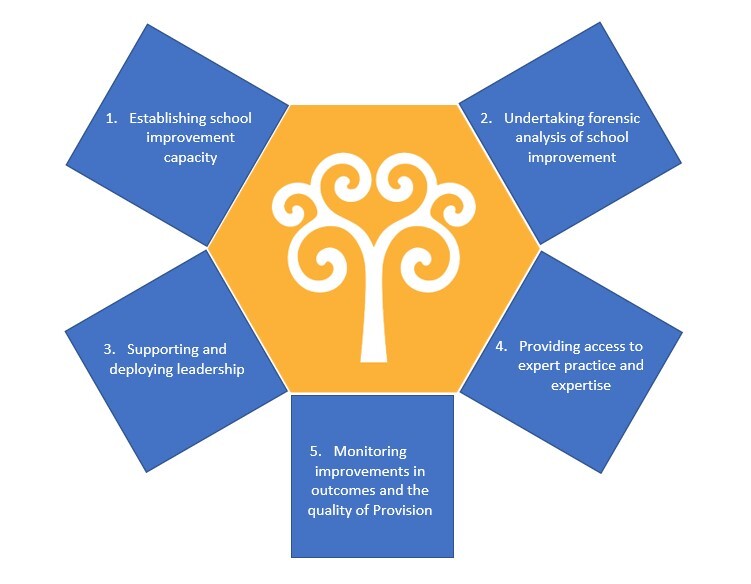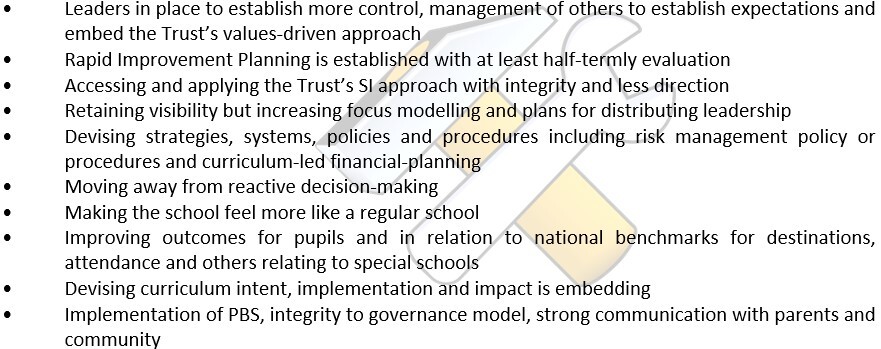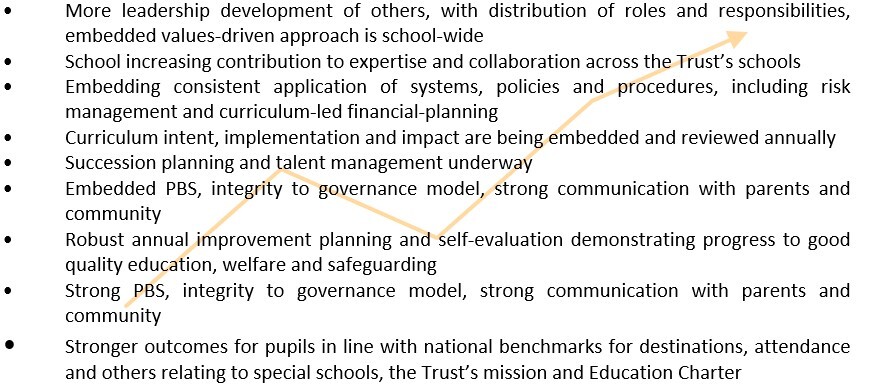- Home
- About Us
- School Improvement Strategy
School Improvement Strategy
Our School Improvement Strategy aims to enable each school to develop and sustain their capacity for improvement so they can deliver the Trust’s Education Charter click here. As a Trust, our pupils remain at the heart of all we do and we aim to provide them with the highest standards of teaching and learning and welfare support so they can achieve the best possible outcomes. In doing so, we are guided by our Trust's Mission and Values click here.
Our approach to school improvement has been shaped by the concept of strong collaboration so that the skills and talents that exist within the Trust’s schools and wider specialist services can benefit all our pupils. It is informed by evidence-based models, adapting those where appropriate to specialist schools. The Trust is a member of The Confederation of Schools Trust (CST). This ensures we keep pace with the latest research and evidence to inform our schools' improvement.
We recognise that there is much to celebrate in every school but each one will be at a different stage on their improvement journey. We also recognise schools can be impacted by significant barriers along the way and our school improvement approach will remain evidence-informed, responsive and proportionate to a school’s improvement needs over time. This approach allows the Trust to build and strengthen our capacity to support more schools as we expand.
OUR TEAM
The CEO is ably-supported by our other trust leaders that have a strong track record of leading school improvement for schools at all stages to drive improvement. High-level expertise in the team covers safeguarding, special needs education and provision as well as trauma -informed culture and practice. Please see our Executive Team.
MEASURING THE CAPACITY FOR SCHOOL IMPROVEMENT
We consider these five fundamentals as identified in Knowledge-Building, School Improvement at Scale 2021

OUR FOUR STAGE IMPROVEMENT MODEL
We have developed an established four-stage improvement model that incorporates relevant characteristics for specialist schools:
PHASE 1: STABILISE

PHASE 2: REPAIR

PHASE 3: IMPROVE

CORE SCHOOL IMPROVEMENT OFFER
All schools in the Trust or those joining the Trust working at any stage in this model will access our core school improvement offer (see drop down menus below). This includes access to our extensive Teaching and Leadership Development Programme click here.
Schools in the Trust, or those joining the Trust, working at the first two stages of the four-stage model will access our core offer but will have enhanced challenge and support, proportionate to identified need as follows:
- The Trust may broker a National or Senior Leader of Education (NLE/SLE) to work with the school to devise and monitor Rapid Improvement Planning (RIP);
- Increased frequency of visits by the CEO;
- Enhanced support or intervention from the Trust’s Executive Team, or other commissioned specialists, brokered by the CEO;
- Mentoring for the school leaders with planned programmes of individualised support;
- Frequent monitoring of RIPs, using ‘Team Around the School' trans-disciplinary meetings. This is designed to be a short-term intervention for up to 12 months and will adopt a project management approach.
- Increased governance oversight to ensure the effectiveness of Rapid Improvement Planning. This includes; weekly CEO reports to the Chair, Trustee participation in monthly TAS meetings to monitor progress, make focused visits to the school and report back to the Trust Board.
1. USE OF ROBUST DIAGNOSIS, REFLECTION & QUALITY ASSURANCE
- The CEO will visit each school at least once every two to three weeks, with interim virtual and telephone support. Working with the school Principals, they will provide support and challenge, celebrate success and broker any additional support for school improvement. Visits will include joint learning walks with the Principal, capturing staff and pupil feedback and reviewing pupil outcomes. The CEO will provide or broker additional capacity to support Principals to devise their annual school improvement plans and review progress, as required.
- School Principals will meet jointly with the CEO, each half term to review progress and impact and identify risks and ways to overcome barriers.
- Schools participate in Challenge Partners, a national network of more than 550 schools and more than 100 trusts, to support improvement through peer review, working together, to combine expertise.
- An experienced, expert central executive team work alongside school leaders to guide, coach and support leadership and school improvement. The Trust’s executive leaders provide weekly on-site support and challenge for each school. The team offers expertise to support school improvement including curriculum-led financial-planning, safeguarding, people development, school operations and health and safety.
- To assure consistent quality improvement, schools at each stage of their development participate in our independent external review process. Education, safety and welfare reviews are brokered by the Trust provided by experts, to enable quality assurance, accurate self-reflection and evaluation.
- The Trust deploys a range of IT solutions and management information systems (MIS) to support leaders with school improvement. Trust leaders retain significant expertise and provide on-site support each week to train and help staff to embed these systems, to enable school improvement, reduce workload and inform diagnosis and improvement planning.

2. A COMPREHENSIVE LEARNING AND DEVELOPMENT PROGRAMME FOR ALL STAFF
- To support learning and development, all our people benefit from high-quality individual performance development (appraisals) to support and plan career pathways and professional development.
- We offer a Trust-wide comprehensive staff benefit package with an enhanced reward and well-being support.
- Opportunities for staff to contribute and feedback through staff surveys, listening sessions and ‘tell us’ (online links) when we make plans or introduce new ideas.
- All schools have access to our ‘Teaching & Leadership Development Programme’. The programme directory is reviewed annually and outlines development opportunities, how to access support and how to become an expert practitioner. There are three key elements to our programme offer:
- Training and courses to support career stage and pathways;
- Peer-to-peer support through professional networks, hub meetings, ongoing virtual support, delivered by the Trust’s expert practitioners. Sharing expertise and resources across our schools avoids duplication, reduces workload;
- Sharing and gaining from effective practice within and beyond our Trust. We are proud of our strong professional community of expert practitioners.
- Extensive professional development opportunities and access to expertise, enhanced by access to our Trust’s own Flourish Specialist Education Services (FSES). Access to expertise beyond the Trust through partnerships with Teaching School Hubs. Our Trust provides CPD for Teaching School Hubs through our PDS.
3. STRONG INTEGRITY & ENGAGEMENT BY ALL TO OUR TRUST-WIDE APPROACHES
- All schools engage and contribute to the Trust’s established governance model and future development.
- School Principals are members of the Trust’s Executive Team to ensure school improvement and pupil outcomes remain at the heart of decision-making and strategic-planning.
- School Principals provide and present termly reports to the Executive Team and Trust Board at the sub-committees for Education Quality and Safeguarding. Effective governance provided through the Trust Board’s Quality of Education committee to ensure robust support, challenge and accountability.
- Our Trust has a defined operating model with common approaches for policy development and provision of shared centralised services. The Flourish Learning Trust Approach sets out where schools and services are expected to align with the Trust, its policies and activities and where they can maintain autonomy to suit their specific contexts. This operating model applies to all schools to enable:
- Leaders to focus on school improvement
- Economies-of-scale and value for money.


